How to Hire AI Engineers in 2026 (Step-by-Step Guide)
- BLOG
- Artificial Intelligence
- September 21, 2025
As an AI Development company ourselves, we can say that trying to hire AI engineers in 2025 can feel like searching for a needle in a stack of GitHub profiles. There’s no shortage of candidates, but finding the right one? That’s where most companies get stuck. AI is no longer a buzzword; it’s a business advantage. Over 40% of companies globally are already using it to cut costs, make smarter decisions, and build intelligent products. But none of that happens without the right engineers behind the scenes. If you’re planning to hire AI engineers this year, this guide will help you do it the smart way, without wasting time, budget, or momentum. An even smarter way would be to work with us. We have the best engineers developing complicated AI systems and resolving AI system issues. Working with Websisoft would be far easier than hiring an engineer.
Contents
- 1 What Does an AI Engineer Do?
- 2 When Should You Hire AI Engineers?
- 3 Top Skills to Look for When Hiring AI Engineers
- 4 Skip the hiring hassle — build with Webisoft’s AI experts today!
- 5 Where to Find the Best AI Engineers
- 6 Step-by-Step Guide to Hiring an AI Engineer
- 7 Avoid These Common Mistakes When Hiring AI Talent
- 8 Why Work With Webisoft Instead of Hiring Alone
- 9 Final Thoughts
- 10 Frequently Asked Questions
- 10.1 1. What does an AI engineer do?
- 10.2 2. Do I need a data scientist or an AI engineer?
- 10.3 3. How long does it take to hire an AI engineer?
- 10.4 4. What should I look for in a good AI engineer?
- 10.5 5. Is it better to hire in-house or work with an agency?
- 10.6 6. Can I hire AI engineers for short-term or part-time work?
What Does an AI Engineer Do?
An AI engineer builds systems that can learn, think, and make decisions on their own. Not in a sci-fi way, but in a practical, business-ready way. They take huge amounts of data. Like customer behavior, images, or text, and turn it into something useful. Maybe it’s a model that recommends products. Maybe it’s a chatbot that sounds human. Maybe it’s a tool that predicts equipment failures before they happen. What makes AI engineers different from regular developers is their focus on learning systems. They don’t just write rules. They build models that improve over time. Depending on the project, you’ll see remote AI engineers working in different areas:
- Natural Language Processing (NLP): Teaching machines to understand and respond to human language
- Computer Vision: Helping AI recognize images, faces, or movement
- Generative AI: Creating new content like text, images, or code
- MLOps: Making sure these models run smoothly and scale without breaking
In short, if you’re building anything that needs to think or adapt, AI engineers are the ones who make that happen.
When Should You Hire AI Engineers?
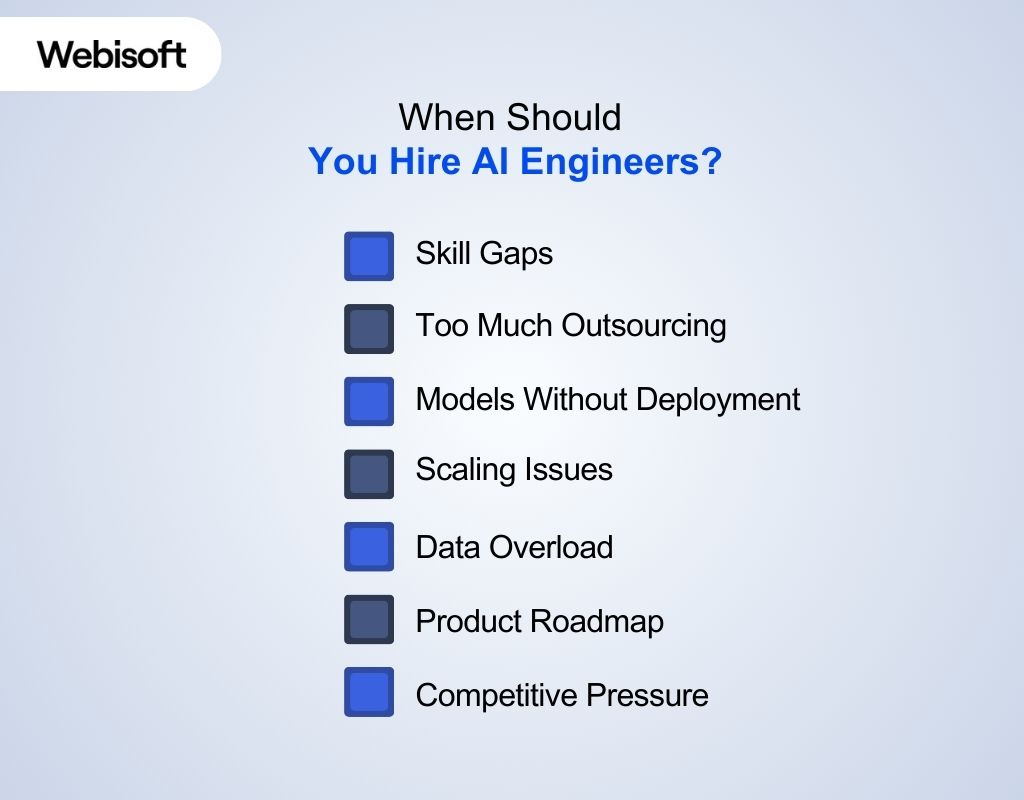 Hiring AI engineers is not about experimenting with AI for the sake of it. It is about knowing when your company needs dedicated specialists to deploy, scale, and maintain intelligent systems. Unlike general developers, AI engineers are focused on turning models into production-ready applications that create real business value.
Hiring AI engineers is not about experimenting with AI for the sake of it. It is about knowing when your company needs dedicated specialists to deploy, scale, and maintain intelligent systems. Unlike general developers, AI engineers are focused on turning models into production-ready applications that create real business value.
1. Skill Gaps
If your current developers can integrate APIs but lack the expertise to customize or scale AI models, that’s a hiring signal. AI engineers bring the depth needed to design, train, and integrate models tailored to your product, rather than relying on off-the-shelf solutions that limit differentiation.
2. Too Much Outsourcing
Many teams start with contractors or third-party vendors, but this gets expensive fast and puts your intellectual property outside your control. If every new iteration depends on external help, you need in-house AI engineers who can build and refine systems continuously, while protecting your core technology.
3. Models Without Deployment
Having trained models is only half the job. Without AI engineers, they often remain unused because no one knows how to deploy, monitor, and maintain them in real products. Engineers close this gap by operationalizing models, ensuring they deliver reliable results at scale.
4. Scaling Issues
Prototypes often collapse under real-world traffic. Bottlenecks appear in data pipelines, response times slow, and reliability drops. AI engineers specialize in optimizing infrastructure, tuning models, and ensuring your systems keep up with growth instead of breaking under pressure.
5. Data Overload
Collecting large amounts of data doesn’t automatically generate value. If you’re sitting on datasets but still making decisions by instinct, it’s time for AI engineers. They can transform raw information into predictions, insights, and automation that make your business smarter and more efficient.
6. Product Roadmap
If your roadmap includes intelligent features like fraud detection, recommendation engines, or chatbots, you’ll need more than general development skills. AI engineers know how to integrate trained models into your product and make them work reliably for your users.
7. Competitive Pressure
When competitors are already hiring AI talent and rolling out smarter products, standing still means falling behind. Bringing AI engineers into your team ensures you can match their pace, or even leap ahead by creating features they can’t easily copy.
Top Skills to Look for When Hiring AI Engineers
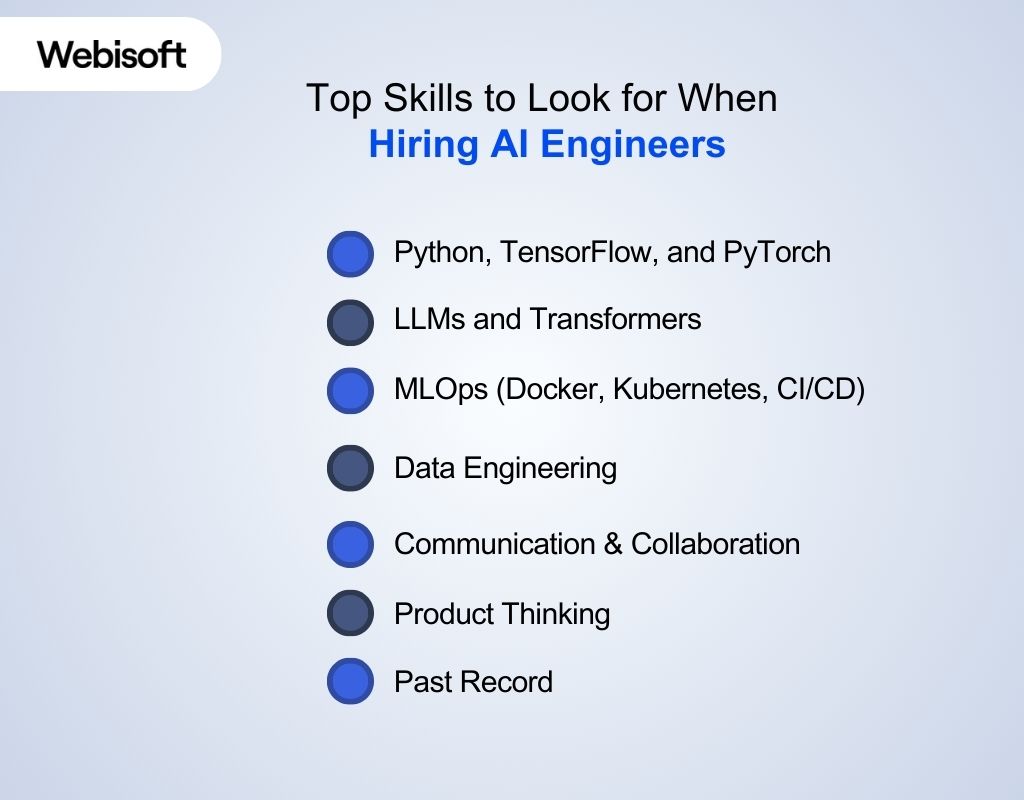 Resumes are great for keywords. But building real-world AI takes more than tools; it takes problem solvers following a clear AI developer roadmap. When you’re hiring an AI engineer, yes, you want someone fluent in Python and familiar with frameworks like PyTorch or TensorFlow. But just as important is how they apply those tools, and whether they understand when not to.
Resumes are great for keywords. But building real-world AI takes more than tools; it takes problem solvers following a clear AI developer roadmap. When you’re hiring an AI engineer, yes, you want someone fluent in Python and familiar with frameworks like PyTorch or TensorFlow. But just as important is how they apply those tools, and whether they understand when not to.
Skill | Why It Matters |
| Python, TensorFlow, PyTorch | Core tools for building and training AI models |
| LLM/Transformer Experience | Essential for generative AI, chatbots, and advanced NLP tasks |
| MLOps (Docker, Kubernetes) | Keeps models running smoothly in production at scale |
| Data Engineering | Ensures clean, usable data flows into models |
| Communication | Critical for cross-functional teamwork and clear decision-making |
| Product Thinking | Connects technical output to real user and business value |
Python, TensorFlow, and PyTorch
These three are the foundation. Python is the language of AI, while TensorFlow and PyTorch are the heavy hitters for training deep learning models. If someone lacks experience here, they’re probably not building anything production-ready.
LLMs and Transformers
If you’re working with generative AI, custom GPT bots, content generation tools, and summarizers, you want someone who understands how large language models behave. Not just how to prompt them, but how to fine-tune, control, and optimize their outputs.
MLOps (Docker, Kubernetes, CI/CD)
A great model means nothing if it breaks the second you deploy it. MLOps ensures models can scale, stay stable, and update without drama. Tools like Docker and Kubernetes keep AI systems reliable under real-world pressure.
Data Engineering
AI is only as smart as the data it’s trained on. Your engineer should know how to clean, preprocess, and structure data at scale. Otherwise, you’ll spend more time fixing bad inputs than building actual features.
Communication & Collaboration
AI engineers don’t work alone. They’ll need to explain their thinking to product managers, collaborate with backend teams, and adjust based on feedback. If they can’t simplify complex ideas, they’ll slow the whole team down.
Product Thinking
This is what separates great engineers from code monkeys. A good AI engineer doesn’t just ask, “Is the model accurate?” They ask, “Does this solve the problem for our users?” That mindset matters more than any fancy algorithm.
Past Record
Tools on a resume don’t prove much. What matters is what the engineer has delivered. Ask what models they’ve deployed to production, how those systems performed under real-world conditions, and what measurable business value their work created. Proven experience shipping AI systems is the strongest predictor of success.
Skip the hiring hassle — build with Webisoft’s AI experts today!
Work directly with proven AI engineers who deliver production-ready solutions without the delays of traditional hiring.
Where to Find the Best AI Engineers
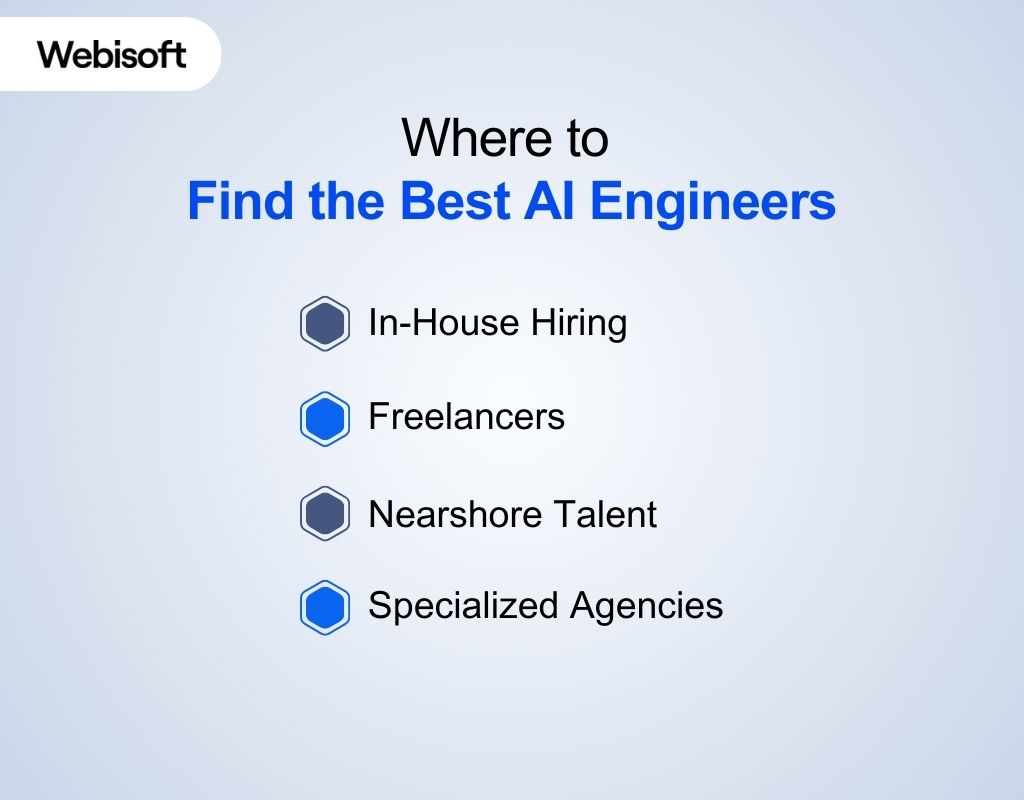 Knowing what to look for in an AI engineer is one thing. Finding one is a whole different challenge. Most companies start by posting on LinkedIn or a job board. But top AI engineers rarely apply cold. They’re either building something interesting already or getting hired through their network. So, what is the best place to hire AI engineers?
Knowing what to look for in an AI engineer is one thing. Finding one is a whole different challenge. Most companies start by posting on LinkedIn or a job board. But top AI engineers rarely apply cold. They’re either building something interesting already or getting hired through their network. So, what is the best place to hire AI engineers?
In-House Hiring
This gives you control and long-term alignment. But it’s time-consuming and expensive. Recruiting, technical vetting, and onboarding—it adds up. And with AI talent in such high demand, you’ll be competing with big tech salaries.
Freelancers
Freelancers can be helpful for short projects, quick experiments, or prototype validation. Just know you’re trading speed for continuity. If your AI feature needs updates or pivots later, your freelance AI developer might be booked or gone.
Nearshore Talent
This is where many companies find the sweet spot: skilled AI engineers in close time zones, without U.S. overhead. Communication is smoother than offshore, and delivery speed is usually faster, too. Just make sure you’re sourcing from trusted networks, not a stack of random resumes.
Specialized Agencies
Some companies don’t have the time to hire one person at a time. That’s where an agency can help, especially one focused on AI. Specialized teams already know how to vet for production-grade AI skills. They can plug into your product fast, reduce onboarding time, and scale with your needs as things evolve. You won’t find elite AI engineers hanging out on job boards. They’re heads down on real work, often brought in through referrals, trusted communities, or direct partnerships. That’s where Webisoft’s AI Development Services come in. We give you instant access to AI-native engineers who are already building smart, scalable systems.
Step-by-Step Guide to Hiring an AI Engineer
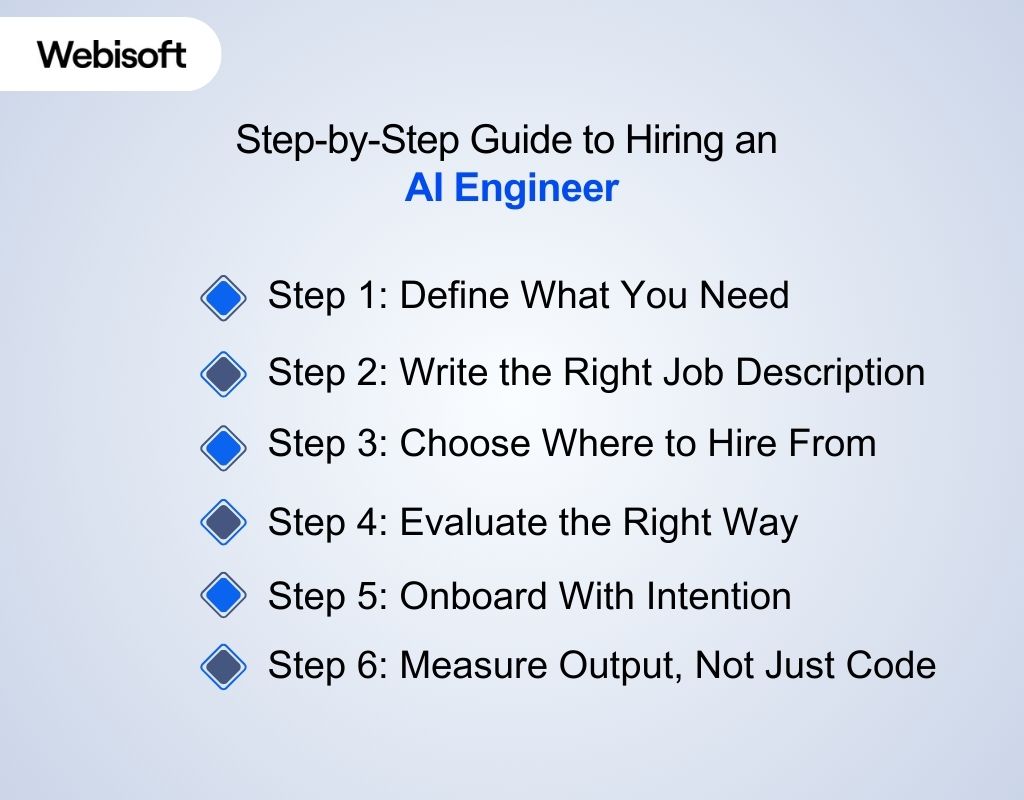 If you want to hire AI engineers, you need to remember this is a process. And skipping steps usually leads to wasted time, bad fits, or missed deadlines. Here’s how to do it right.
If you want to hire AI engineers, you need to remember this is a process. And skipping steps usually leads to wasted time, bad fits, or missed deadlines. Here’s how to do it right.
Step 1: Define What You Need
Start by getting clear on what kind of engineer your project requires. Is this a product that needs real-time personalization? You’ll want someone strong in machine learning. Is it LLM-related? You’ll need someone with experience in transformers. Do you already have data scientists but lack the engineering power to ship models into production? You’re probably looking for MLOps or backend integration support. Be specific. “We need AI” is too vague. Knowing your goals helps you filter out mismatched candidates before they waste your time.
Step 2: Write the Right Job Description
A great job post doesn’t just list tools. It tells candidates what problem they’ll be solving, what kind of data they’ll work with, and how success will be measured. Skip the generic fluff. Engineers want clarity:
- What’s the product?
- What’s the data stack?
- Will they be building from scratch or improving existing models?
The more real your post feels, the more serious candidates you’ll attract.
Step 3: Choose Where to Hire From
In-House
Best for building a core AI team with full control and cultural fit. Works if AI is central to your business.
- Challenge: High cost and long hiring cycles.
Freelancers
Great for short projects, prototypes, or specialized tasks. Flexible and fast to onboard.
- Challenge: Limited consistency and oversight are needed.
- Platforms: Upwork, Toptal, Analytics Insight list
Nearshore
Nearshore teams balance cost, quality, and collaboration. Webisoft stands out with senior-level engineers, strong AI expertise, and offices in Montreal and Miami for smooth time zone alignment. Perfect for companies scaling AI without offshore headaches.
- Platform: webisoft.com
- Challenge: Higher cost than offshore, though still cheaper than in-house.
Recruitment Agencies
Fastest route to vetted AI talent, ideal for urgent or niche hires.
- Challenge: Placement fees (15–25% of salary).
- Top agencies: Data Teams, GoGloby, People in AI
Step 4: Evaluate the Right Way
Don’t just rely on resumes or whiteboard tests. Run a hands-on assessment with a real (or sanitized) dataset. Ask them to walk you through their approach to modeling, preprocessing, or debugging. Also: check references. Ask about reliability, handoff quality, and how well they worked with non-technical stakeholders.
Step 5: Onboard With Intention
Give them access to everything they need upfront: data, documentation, and team context. Clarify timelines, expectations, and decision-makers from the start. Engineers thrive with direction, not micromanagement. You don’t need to spoon-feed them, but they should know what “done” looks like from day one.
Step 6: Measure Output, Not Just Code
Once your engineer is up and running, track the right things:
- Are models shipping on time?
- Are results improving over iterations?
- Is the engineering effort turning into product value?
Good AI work shows up in user experience, revenue lift, or time saved, not just Git commits. Want to skip the guesswork? Webisoft gives you direct access to AI engineers who’ve already passed the vetting process.
Avoid These Common Mistakes When Hiring AI Talent
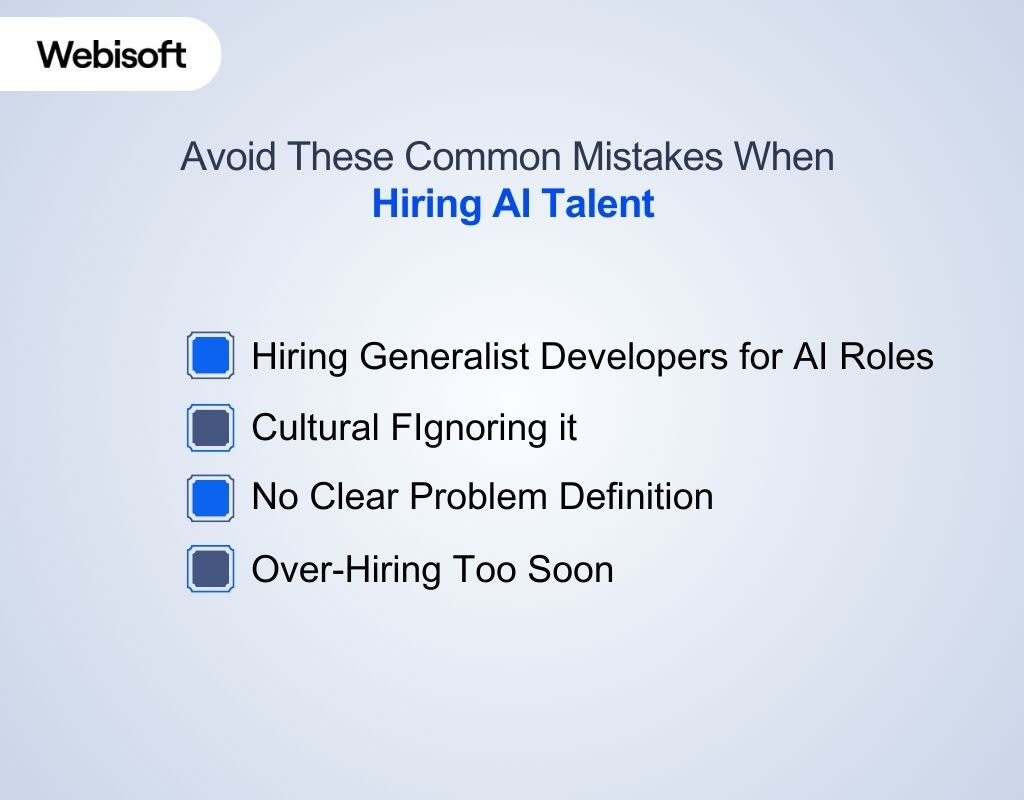 Here are four mistakes we see companies make all the time, and here’s how to dodge them:
Here are four mistakes we see companies make all the time, and here’s how to dodge them:
1. Hiring Generalist Developers for AI Roles
AI isn’t something you just “pick up” over a weekend. Generalist devs might be great at product or backend work, but that doesn’t mean they understand model architecture, data pipelines, or LLM tuning. If your project depends on machine learning or generative AI, you need someone who’s been in that space before, not just someone curious about it.
2. Cultural FIgnoring it
AI engineers don’t work in isolation. They need to collaborate with product leads, analysts, and other devs. If they can’t communicate, work async, or mesh with your team’s rhythm, even the smartest person can slow the whole project down. Technical skills matter, but they won’t carry a project alone.
3. No Clear Problem Definition
“We need AI” isn’t a hiring strategy. Without a clear problem to solve, you’re setting your engineer up for confusion and wasted time. Whether it’s prediction, automation, or personalization, define what success looks like before you even start hiring.
4. Over-Hiring Too Soon
Some teams bring in multiple AI specialists before testing whether AI even fits the use case. Start learning. Validate the opportunity with one experienced engineer. Once you have proof of value, then scale your AI team.
Why Work With Webisoft Instead of Hiring Alone
Hiring AI engineers in-house takes weeks, costs a fortune, and often leaves you guessing whether you’ve made the right choice. That’s why so many companies skip the hiring grind and partner with Webisoft instead. At Webisoft, you don’t have to spend months recruiting or worrying about whether your engineer can deliver. You get instant access to senior-level AI talent that’s already vetted, experienced, and ready to build production-grade AI engineering services.
- No hiring delays – start working with an AI engineer in days, not months.
- Proven expertise – from LLM integrations to computer vision, our engineers have already shipped real-world solutions.
- Flexible engagement – scale up or down as your roadmap evolves, without long-term contracts.
- Full-stack capability – whether you need MLOps, data engineering, or end-to-end product development, we’ve got you covered.
Instead of burning cycles trying to hire AI engineers one by one, you can move faster by working with Webisoft — a partner that delivers results, not just resumes.
Final Thoughts
Hiring AI engineers doesn’t have to feel like a guessing game. When you hire AI engineers who understand your vision and fit how your team works, everything starts to click. If you’re ready to bring serious AI talent onto your team without the hassle of endless sourcing and vetting, Webisoft can help. Whether you need one engineer or a dedicated team, we connect you with proven talent who deliver from day one.
Frequently Asked Questions
1. What does an AI engineer do?
AI engineers build systems that learn from data and make decisions, things as recommendation engines, chatbots, fraud detection models, or automation tools. They turn complex data into working software that improves over time.
2. Do I need a data scientist or an AI engineer?
It depends. Data scientists focus on analyzing data and finding insights. AI engineers turn those insights into scalable products. If you’re building a tool or feature powered by machine learning, you likely need an AI engineer, or both.
3. How long does it take to hire an AI engineer?
Traditional hiring can take 6–12 weeks, depending on your location and process. But if you work with a partner like Webisoft, you can often start with a vetted engineer in just a few days.
4. What should I look for in a good AI engineer?
Look for strong skills in Python, machine learning frameworks (like TensorFlow or PyTorch), experience with data pipelines, and real-world project delivery. Bonus points for communication skills and product thinking.
5. Is it better to hire in-house or work with an agency?
Hiring in-house gives you long-term control, but it’s slower and more expensive. Agencies like Webisoft offer speed, flexibility, and access to pre-vetted engineers. This is ideal for startups or growing teams that need to move fast.
6. Can I hire AI engineers for short-term or part-time work?
Yes. Webisoft offers flexible engagement options, including part-time, project-based, and full-time contracts, depending on what you need.


